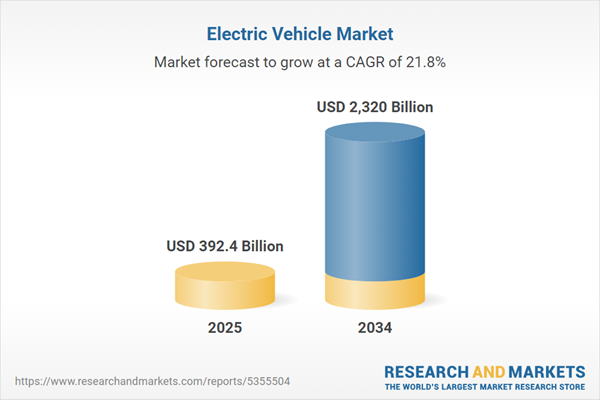Dublin, Aug. 14, 2025 (GLOBE NEWSWIRE) -- The "Electric Vehicle Market Outlook 2025-2034: Market Share, and Growth Analysis By Type (Battery Electric Vehicle, Plug-In Hybrid Electric Vehicle, Fuel Cell Electric Vehicle), By Vehicle Type, By Charging Type, By Power Output, By End Use" has been added to ResearchAndMarkets.com's offering.
The Electric Vehicle (EV) market, valued at USD 392.4 billion in 2025, is projected to reach global sales of USD 2.32 trillion by 2034, marking a robust CAGR of 21.8%.
This growth is fueled by advancements in EV technology, stringent government policies on emissions, and a significant shift in consumer preferences towards sustainable transportation. The evolution of lithium-ion batteries is pivotal, offering benefits over traditional combustion engines, such as lower emissions, reduced fuel consumption, and enhanced driving comfort. As governments intensify efforts to tighten emission standards, automakers are increasingly prioritizing EV production, resulting in the proliferation of electric cars, buses, and trucks.
The burgeoning market is buoyed by strategic investments in charging infrastructure and battery technologies aiming to lower costs and extend range efficiencies. 2024 highlighted crucial developments with key manufacturers broadening their EV range and introducing models featuring extended driving distances and accelerated charging capabilities. The rise in commercial fleet electrification is notable, driven by economic and environmental advantages, prompting businesses to adopt EVs extensively.
Government initiatives, including tax incentives and subsidies, have effectively spurred market growth, particularly in emerging economies. Automakers continue investing heavily in R&D to refine battery technology, targeting reduced production costs and enhanced energy outputs. Concurrently, shared mobility services, such as electric taxis and ride-sharing platforms, have accelerated EV demand.
Looking ahead, the market is expected to maintain its upward trajectory, propelled by technological innovations and growing consumer acceptance. By 2025, EVs are projected to match traditional vehicles in terms of acquisition costs, broadening their appeal across consumer demographics. Next-gen batteries, such as solid-state and sodium-ion variants, promise to revolutionize efficiency with higher energy densities and quicker charge times, addressing prevalent consumer concerns.
The pressing climate change agenda globally continues to propel EV demand as countries uphold stricter emissions regulations and expedite transitions to renewable energy solutions. The anticipated expansion of charging networks will alleviate convenience barriers, especially in underserved regions. As competition among automakers intensifies, consumer choice will expand, leading to more cost-effective and innovative EV offerings. It is anticipated that by 2030, a substantial share of global vehicle sales will consist of electric vehicles, prominently reshaping the automotive landscape.
Electric Vehicle Market Insights
- Increased availability of affordable EVs, underpinned by battery advancements and economies of scale.
- Enhanced global charging infrastructure mitigating range anxiety and facilitating consumer convenience.
- Increase in electric commercial fleets driven by lowering operational costs and diminished environmental impacts.
- Advancements in battery chemistries offering superior energy densities and accelerated charge times.
- Rising trend of electric vehicle leasing and shared mobility services, offering adaptable ownership models.
- Government incentives fostering EV uptake through rebates, grants, and regulatory measures.
- Technological advancements in EV batteries enhancing range, charge speeds, and cost efficiencies.
- Expansion of EV charging infrastructure augmenting practicality for routine use.
- Scarcity of crucial raw materials like lithium and cobalt challenging scalability and supply chain sustainability.
Key Attributes:
| Report Attribute | Details |
| No. of Pages | 150 |
| Forecast Period | 2025 - 2034 |
| Estimated Market Value in 2025 | 392.4 Billion |
| Forecasted Market Value by 2034 | 2320 Billion |
| Compound Annual Growth Rate | 21.8% |
| Regions Covered | Global |
Companies Featured
- Volkswagen AG
- Toyota Motor Corporation
- Ford Motor Company
- General Motors Company
- BMW Group
- Honda Motor Co.
- Hyundai Motor Company
- SAIC Motor Corporation Limited
- Tesla Inc.
- Nissan Motors Co. Ltd.
- Audi AG
- Kia Motors Corporation
- BYD Company motors
- Daimler AG
- Groupe Renault
- TATA Motors Limited
- Volvo Car Corporation
- Stellantis N.V.-Dodge
- Geely Automobile Holdings Limited
- NIO lnc.
- Xpeng lnc.
- Rivian Automotive Inc.
- Lucid Motors lnc.
- Canoo Holdings Ltd.
- Faraday Future Corporation
- Bollinger Motors Inc.
- Mahindra and Mahindra Ltd.
- Genesis Motor LLC
- Fisker lnc.
- The Cadillac Motor Car Division
- Lotus Cars Limited
- Jaguar Land Rover Automotive plc
Electric Vehicle Market Segmentation
By Type
- Battery Electric Vehicle
- Plug-In Hybrid Electric Vehicle
- Fuel Cell Electric Vehicle
By Vehicle Type
- Two-Wheelers
- Passenger Cars
- Commercial Vehicles
By Charging Type
- Slow Charging
- Fast Charging
By Power Output
- Less Than 100 kW
- 100 kW To 250 kW
- More Than 250 kW
By End Use
- Private
- Commercial Fleets
By Geography
- North America (USA, Canada, Mexico)
- Europe (Germany, UK, France, Spain, Italy, Rest of Europe)
- Asia-Pacific (China, India, Japan, Australia, Vietnam, Rest of APAC)
- The Middle East and Africa (Middle East, Africa)
- South and Central America (Brazil, Argentina, Rest of SCA)
For more information about this report visit https://www.researchandmarkets.com/r/etao6o
About ResearchAndMarkets.com
ResearchAndMarkets.com is the world's leading source for international market research reports and market data. We provide you with the latest data on international and regional markets, key industries, the top companies, new products and the latest trends.
Attachment
